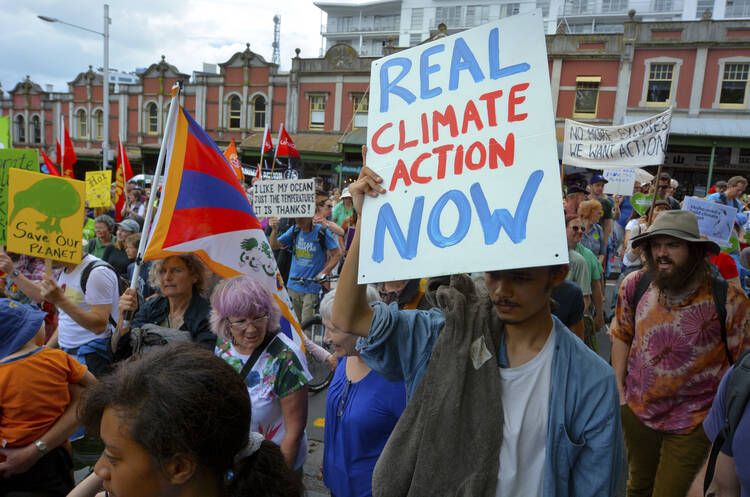In a first-ever papal message for the World Day of Prayer for the Care of Creation, Pope Francis has called on believers everywhere to recognize and repent of “our sins against creation, the poor and future generations.”
The three-page message, “Show Mercy to Our Common Home,” is “the next logical step” after the pope’s ground-breaking ecological encyclical “Laudato Si’,” Cardinal Peter Turkson, president of the Pontifical Council for Justice and Peace, said at a Vatican press conference on Sept. 1. The event was chaired for the first time by Greg Burke, the new Director of the Holy See Press Office.
With the message, Francis sought to renew his dialogue with “every person living on this planet, about the sufferings of the poor and the devastation of the environment” and to draw attention to the ongoing threat of global warming. He noted, “2015 was the warmest year on record, and 2016 will likely be warmer still.”
All this, he said: “is leading to ever more severe droughts, floods, fires and extreme weather events. Climate change is also contributing to the heart-rending refugee crisis. The world’s poor, though least responsible for climate change, are most vulnerable and already suffering its impact.”
Having presented his case, the Jesuit pope emphasized the need for an examination of conscience at the individual and community level, and the need to repent and change course.
He recalled that in the Jubilee Year 2000, St. John Paul II “asked Catholics to make amends for past and present religious intolerance, as well as for injustice towards Jews, women, indigenous peoples, immigrants, the poor and the unborn.” And in this Jubilee of Mercy, he said, “I invite everyone to do likewise.”
Francis denounced the fact that today many have become accustomed to a way of life “shaped by a distorted culture of prosperity and a disordered desire to consume more than what is really necessary.”
“We are participants in a system that has imposed the mentality of profit at any price,” he said, “with no concern for social exclusion or the destruction of nature.” He called for new ways of living and acting to protect creation, ways both small and big.
In particular, Pope Francis issued a clarion call to the world’s citizens to put pressure on their governments to respect the commitments they made a year ago at the United Nations in New York to sustainable development goals and last December in Paris to halt the rise of global temperatures. Governments are obliged to honor those commitments and businesses must do their part, too, he stated. He emphasized that “it is up to citizens to insist that this happen, and indeed to advocate even more ambitious goals.”
But many are reluctant to take action to protect this common home, Cardinal Turkson told the press. He highlighted that fact that so far only 27 states have ratified the Paris treaty on climate change. He emphasized the urgent need for popular action to safeguard creation, including through divestment from fossil fuels and the use of boycotts.
Pope Francis, who will lead a prayer service in St. Peter’s Basilica for the care of creation this evening, began his message by highlighting the ecumenical dimension of this day, which is being celebrated in unison with the Orthodox churches and other Christian churches and communities across the globe.
He decided that the Catholic Church should participate fully in this event after the Orthodox Metropolitan John of Pergamon, representing Bartholomew I, called for this in his presentation of the pope’s encyclical in Rome, June 2015. The Vatican hastily put together its first-ever World Day of Prayer for Creation on Sept. 1, 2015, as Bishop Brian Farrell, secretary of the Pontifical Council for the Promotion of Christian Unity, told the press. He said, “It is a great sign of ecumenical progress that Christians in all churches are joining together in prayer at the same time to praise God for his work, to seek his protection on it and to re-commit themselves to safeguarding it.”
In his message, Pope Francis seeks to instill the urgent need for repentance and a change of lifestyle into the hearts and consciences of all believers and, to this end, he has added an eighth work of mercy to the seven corporal and spiritual works of mercy that have been part of traditional Christian spirituality for so many centuries: “Care for our common home.”
As a spiritual work of mercy, the pope said, care for our common home calls for “a grateful contemplation of God’s world,” which “allows us to discover in each thing a teaching which God wishes to hand onto us.” As a corporal work of mercy, he explained, it requires “simple daily gestures which break with the logic of violence, exploitation and selfishness” and “makes itself felt in every action that seeks to build a better world.”
At the press conference, Terence Ward, the Irish-born author of The Guardian of Mercy, recalled that there were originally six works of mercy based on Jesus’ words in St. Matthew’s Gospel, but in the medieval period a seventh was added: Bury the dead. That Pope Francis has added this eighth work is “groundbreaking and visionary, ecumenical and ecological,” he said.








